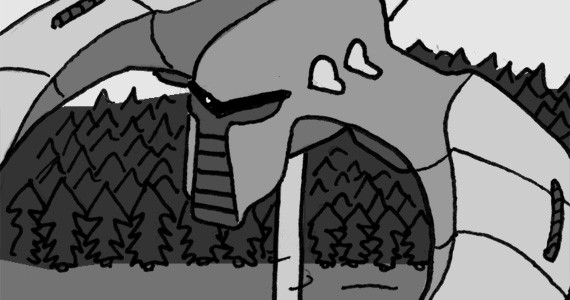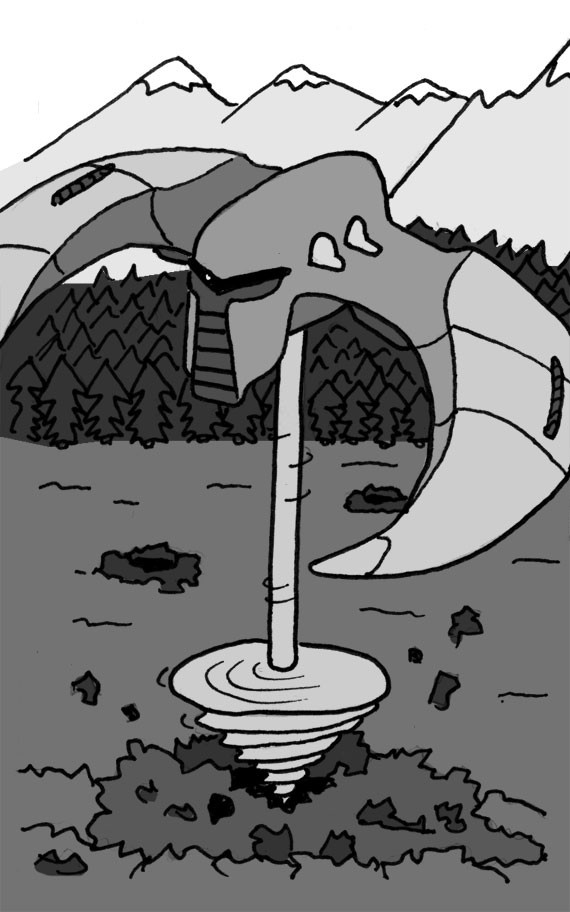Hydraulic fracturing---or fracking---is the latest example of making things worse in the name of saving the humans, and it looks to have a date with Nova Scotia. Just before Christmas, the department of energy announced it was taking bids on oil and gas exploration on the north shore. The province currently holds six inshore natural gas exploration agreements, one production lease and two production agreements.
Fracking is a method of mining inshore natural gas. Natural gas is supposed to stop climate change. It burns clean and doesn't release as much greenhouse gas as coal and oil, our main energy sources.
But, like oil, natural gas is getting harder to access. Oil and gas companies like it because it's expensive and local, hence the recent spike in inshore natural gas exploration across North America. Fracking is a relatively cheap, though energy intensive, way to get at inshore natural gas deposits. More than 75,000 new wells have been drilled in five years.
Here's a rundown of the process, according to the Natural Resources Defense Council: First, clear a couple of hectares of land for each natural gas well. Drill down a few hundred (or thousand) metres and slice around underneath the shale, blast in at least nine million litres of water, plenty of sand and a variety of chemicals (many of which are known or possible human carcinogens, air pollutants or cause other chronic health problems) in order to access the gas. Bonuses include heavy metals, volatile organic compounds and radioactive elements. Score for the environment!
Life might just be that easy if it wasn't for annoying Cornell professors like Robert Howarth, who likes to pee on clean-air parades by looking at the "big picture," the impacts of natural gas beyond just how it burns. Howarth found that the harvesting, transport, processing and use of natural gas leaks so much methane (which fudges the climate 72 times worse than carbon dioxide) that you can't really call it significantly greener than coal, and it's worse than oil. That's going only on reported leakages. The reality is worse, "big picture" wise.
That says nothing of fracking's direct impacts on land, water and people. There have been numerous explosions, drinking- well contaminations, overflows and massive leakages at fracking sites in the US. NRDC reports that "fracking fluid is suspected of contaminating drinking water in Arkansas, Colorado, North Dakota, Texas, Wyoming and other states."
Fracking is scarcely regulated. Jennifer West, a geologist at the Ecology Action Centre, says in Nova Scotia, which has initiated an environmental review of fracking, "there are air quality guidelines for industrial sites but they are blanket guidelines for all industries and may not be suitable to a fracking site."
If other jurisdictions offer a clue industry would largely self-regulate its fracking sites. NRDC notes, for example, that West Virginia has just 12 inspectors monitoring more than 60,000 wells. "There are industry best practices in the oil and gas industry, and that is mostly what the government is assessing. In other words, let the industry regulate themselves because we wouldn't know where to start."
Kathleen Johnson, an environmental engineer with Nova Scotia Environment, argues that existing rules should be adequate. "The air quality conditions that are applied to petroleum exploration operations are specific to that type of operation," she says.
"Industrial approvals require details about where the activity is being proposed, including proximity to water courses, details on fluids ---including handling and disposal---monitoring of fluids and an emergency response plan. Approvals for the petroleum industry also require a 'blowout preventer' designed to prevent the uncontrolled release of fluids into the environment."
Johnson adds that companies are required to disclose any additives they use. These are then appropriately monitored.
The public, however, seems less than reassured. NSE asked for preliminary comments on fracking and received 279 responses, almost all of them opposed. Nearly half demanded, unprompted, a ban or moratorium on fracking. Most submissions stress heavy pollution and high risk.
Brennan Vogel, an energy coordinator for the Ecology Action Centre, wrote, "There are low-impact and proven methods of producing natural gas (methane) from agricultural residues, municipal sewage and waste." So why inject chemicals into the earth in the name of climate change mitigation?


